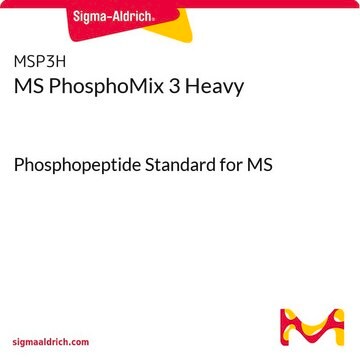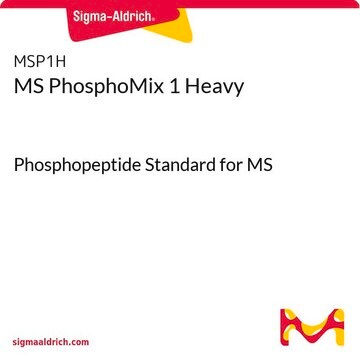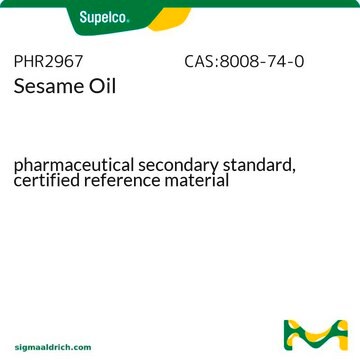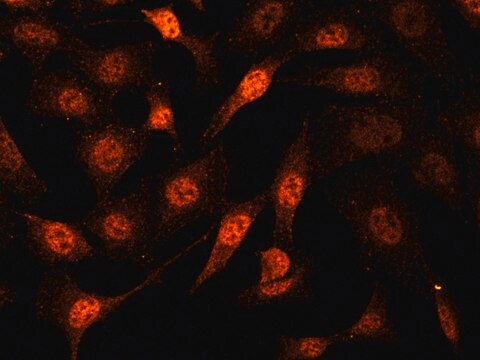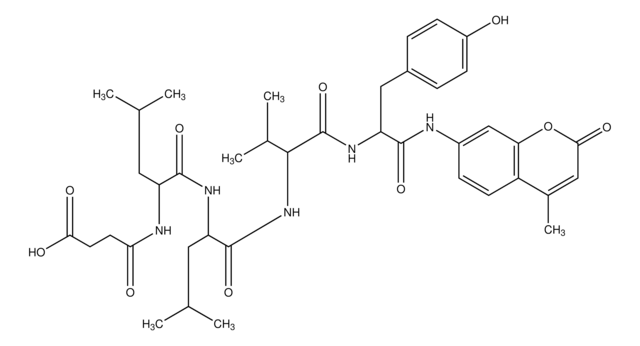APT280
20S Proteasome Activity Assay
Synonym(s):
20S Proteasome Assay, Proteasome Activity Kit, Proteasome Assay, proteosome activity assay kit
About This Item
Recommended Products
General description
The ubiquitin-proteasome pathway is the major proteolytic system in the cytosol of eukaryotic cells, where it catalyzes the selective degradation of short-lived regulatory proteins and the rapid elimination of proteins with abnormal conformation (Hershko & Ciechanover 1998; Hochstrasser 1996). The critical protease in this pathway is the 26S proteasome, an ATP-dependent proteolytic complex, which is formed by the association of the barrel-shaped 20S proteasome (700-kDa) and two 19S (700-kDa) regulatory complexes (Baumeister et al. 1998; Coux et al. 1996). The 20S Proteasome, catalytic core of the proteasome complex, is responsible for the breakdown of key proteins involved with apoptosis, DNA repair, endocytosis, and cell cycle control (Coux et al. 1996; Hoffman & Rechsteiner 1996; Hochstrasser 1995). The CHEMICON® Proteasome Activity Assay Kit provides a quick, efficient and sensitive system for evaluation of proteasome activity in cell lysates or inhibitor screening.
Test Principle:
Chemicon′s Proteasome Activity Assay Kit provides a simple and convenient means for assaying proteasome activity that recognize the substrate LLVY (Meng et al. 1999). The assay is based on detection of the fluorophore 7-Amino-4-methylcoumarin (AMC) after cleavage from the labeled substrate LLVY-AMC. Absorption=351nm. Emission=430nm. The free AMC fluorescence can be quantified using a 380/460 nm filter set in a fluorometer.
A proteasome inhibitor, Lactacystin, is included as a test inhibitor for screening purpose. Lactacystin is a microbial natural product and the most specific and potent inhibitor of proteasomes currently known (Fenteany & Schreiber 1998).
Application:
The Proteasome Activity Assay Kit is a relatively quick method for detection of intracellular proteasome activity. Testing of purified proteasome enzyme, in vitro inhibitor screening and the study of proteasome regulation can be performed with this assay.
The CHEMICON Proteasome Activity Assay Kit is intended for research use only, not for diagnostic or therapeutic applications.
Application
Also see: Hoffman, L. 1992 at http://www.jbc.org/cgi/reprint/267/31/22362.pdf
Other Notes
Legal Information
Storage Class Code
10 - Combustible liquids
Regulatory Listings
Regulatory Listings are mainly provided for chemical products. Only limited information can be provided here for non-chemical products. No entry means none of the components are listed. It is the user’s obligation to ensure the safe and legal use of the product.
JAN Code
APT280:
Certificates of Analysis (COA)
Search for Certificates of Analysis (COA) by entering the products Lot/Batch Number. Lot and Batch Numbers can be found on a product’s label following the words ‘Lot’ or ‘Batch’.
Already Own This Product?
Find documentation for the products that you have recently purchased in the Document Library.
Our team of scientists has experience in all areas of research including Life Science, Material Science, Chemical Synthesis, Chromatography, Analytical and many others.
Contact Technical Service


